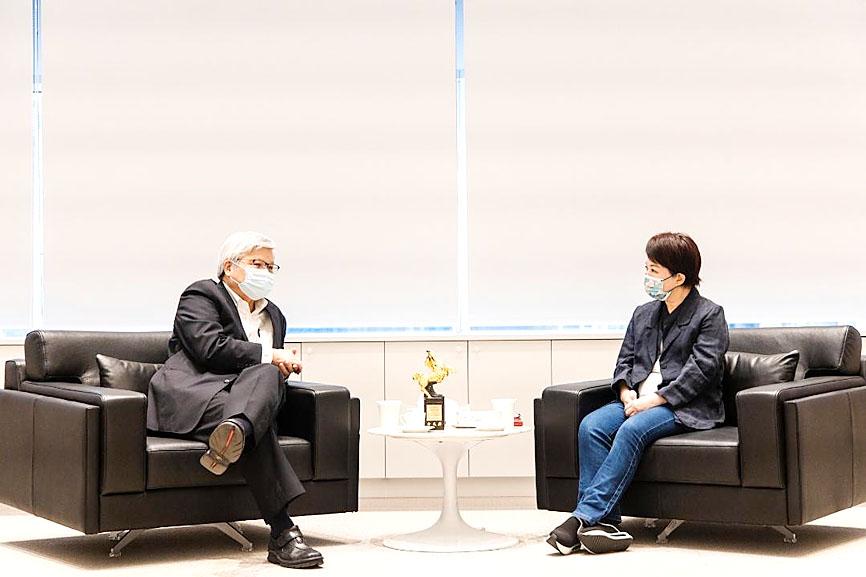A meeting last week between Taiwan Semiconductor Manufacturing Co (TSMC, 台積電) chief executive C.C. Wei (魏哲家) and Taichung Mayor Lu Shiow-yen (盧秀燕) is believed by some analysts to indicate that the chipmaker is planning to build a 2-nanometer fabrication plant in the city.
Accompanied by three TSMC vice presidents — Wang Ying-lang (王英郎) of fab operations, Arthur Chuang (莊子壽) of the facility division and Jonathan Lee (李俊賢) of corporate planning — Wei met with Lu and a team of top city officials on Friday, the city government said in a statement on Saturday.
Lu expressed that hope that TSMC, the world’s largest contract chipmaker, could build plants in Taichung and help boost the city’s economic development, it said.

Photo courtesy of the Taichung City Government
ENVIRONMENT
The statement quoted Wei as saying that Taichung’s climate and location are excellent, while its numerous schools, malls and hospitals attract talent to settle and work there, making the city a good place for the company to expand its manufacturing capacity.
Lu praised the city’s “favorable investment environment,” telling TSMC officials that since she took office three years ago, a number of companies have invested in the city, such as the second-phase expansion of the Mitsui Outlet Park at the Port of Taichung and the construction of the Lalaport shopping center operated by the Mitsui brand, as well as several offshore wind power projects, the statement said.
The central government’s “Invest in Taiwan” initiative has attracted 231 companies to Taichung, creating more than 21,000 local jobs, Lu added.
On Saturday, TSMC told the Central News Agency that the company has a wafer plant in Taichung and Wei paid a courtesy visit to the city government.
However, analysts have said that there was no precedent for the CEO to visit the local government where its production facility is located.
SPECULATION
Considering the management team members who attended the meeting, analysts have speculated that the visit had something to do with the company’s plan to expand production capacity at its 2-nanometer fab in Taichung.
After it scaled up production of its 5-nanometer chips last year, TSMC said that it would begin mass producing 3-nanometer chips in the second half of next and 2-nanometer chips in 2025.
A company source familiar with the matter said that TSMC plans to develop a plot of land in Hsinchu’s Baoshan Township (寶山), which would include a 2-nanometer fab.
However, the plot is not big enough to allow the company to expand its production facilities, so TSMC management might be seeking a new lot on which to build another factory in Taichung, the source said.

SEMICONDUCTORS: The German laser and plasma generator company will expand its local services as its specialized offerings support Taiwan’s semiconductor industries Trumpf SE + Co KG, a global leader in supplying laser technology and plasma generators used in chip production, is expanding its investments in Taiwan in an effort to deeply integrate into the global semiconductor supply chain in the pursuit of growth. The company, headquartered in Ditzingen, Germany, has invested significantly in a newly inaugurated regional technical center for plasma generators in Taoyuan, its latest expansion in Taiwan after being engaged in various industries for more than 25 years. The center, the first of its kind Trumpf built outside Germany, aims to serve customers from Taiwan, Japan, Southeast Asia and South Korea,

Gasoline and diesel prices at domestic fuel stations are to fall NT$0.2 per liter this week, down for a second consecutive week, CPC Corp, Taiwan (台灣中油) and Formosa Petrochemical Corp (台塑石化) announced yesterday. Effective today, gasoline prices at CPC and Formosa stations are to drop to NT$26.4, NT$27.9 and NT$29.9 per liter for 92, 95 and 98-octane unleaded gasoline respectively, the companies said in separate statements. The price of premium diesel is to fall to NT$24.8 per liter at CPC stations and NT$24.6 at Formosa pumps, they said. The price adjustments came even as international crude oil prices rose last week, as traders

POWERING UP: PSUs for AI servers made up about 50% of Delta’s total server PSU revenue during the first three quarters of last year, the company said Power supply and electronic components maker Delta Electronics Inc (台達電) reported record-high revenue of NT$161.61 billion (US$5.11 billion) for last quarter and said it remains positive about this quarter. Last quarter’s figure was up 7.6 percent from the previous quarter and 41.51 percent higher than a year earlier, and largely in line with Yuanta Securities Investment Consulting Co’s (元大投顧) forecast of NT$160 billion. Delta’s annual revenue last year rose 31.76 percent year-on-year to NT$554.89 billion, also a record high for the company. Its strong performance reflected continued demand for high-performance power solutions and advanced liquid-cooling products used in artificial intelligence (AI) data centers,

SIZE MATTERS: TSMC started phasing out 8-inch wafer production last year, while Samsung is more aggressively retiring 8-inch capacity, TrendForce said Chipmakers are expected to raise prices of 8-inch wafers by up to 20 percent this year on concern over supply constraints as major contract chipmakers Taiwan Semiconductor Manufacturing Co (TSMC, 台積電) and Samsung Electronics Co gradually retire less advanced wafer capacity, TrendForce Corp (集邦科技) said yesterday. It is the first significant across-the-board price hike since a global semiconductor correction in 2023, the Taipei-based market researcher said in a report. Global 8-inch wafer capacity slid 0.3 percent year-on-year last year, although 8-inch wafer prices still hovered at relatively stable levels throughout the year, TrendForce said. The downward trend is expected to continue this year,